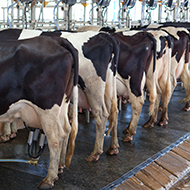
VMD updates list of available products
The Veterinary Medicines Directorate (VMD) has reported supply problems with certain lactating cow intramammary antibiotics.
The following is a list of lactating cow intramammary antibiotics that Marketing Authorisation Holders (MAHs) have noted availability problems for, along with anticipated resolution dates for each product:
| Product | Anticipated resolution date |
| Synulox Lactating Cow Intramammary Suspension (42058/4143) | First quarter of 2021 |
| Tetra-Delta Intramammary Suspension (42058/4152) | First half of 2021 |
| Ubro Yellow Milking Cow Intramammary Suspension (08327/4305) | Product discontinued – no return date |
| Multiject IMM Intramammary Suspension (02000/4062) | February 2021 |
| Albiotic 330mg/100mg Intramammary Solution (30282/4035) | December 2020 |
| Mastiplan LC, 300mg/20mg Intramammary Suspension (01708/4534) | End of November 2020 |
| Cobactan MC Intramammary Suspension for Lactating Cows (01708/4444)* | December 2020 |
| Combiclav Intramammary Suspension for Lactating Cows (02000/4424) | January 2021 |
| Cefimam LC, 75 mg Intramammary Ointment for Lactating Cows (02000/4387)* | product discontinued – no return date |
These lactating cow intramammary products have been reported as available for veterinary surgeons to purchase:
Ubropen 600 mg Intramammary Suspension for Lactating Cows (42810/4000)
Ubrolexin Intramammary Suspension for Lactating Dairy Cows (08327/4306)
Procapen Injector 3g intramammary suspension for cattle (24745/4023)
Orbenin L.A. 200mg Intramammary Suspension (42058/4090)
Pathocef 250mg Intramammary Suspension (42058/4094)*
Please note: VMD states that the products marked with a '*' are defined as a Highest Priority Critically Important Antibiotics for human medicine and, under the Red Tractor farm assurance scheme for beef and dairy, should be used as a last resort and supported by sensitivity and/or diagnostic testing.
For further details of the supply situation for individual UK-authorised products, please contact the MAH or a wholesale dealer.



 The latest
The latest